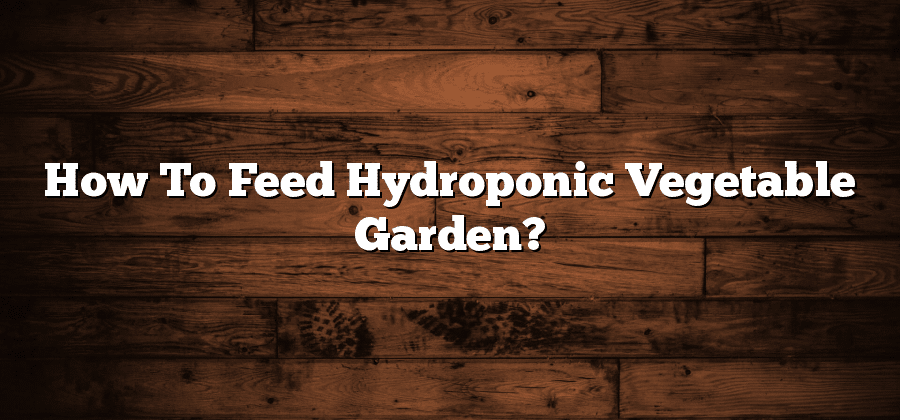Essential Nutrients for Hydroponic Vegetable Gardens
Hydroponic vegetable gardens offer a unique and efficient way to grow fresh produce. One of the essential aspects of successful hydroponic gardening is ensuring that your plants receive the right balance of nutrients. Unlike traditional soil-based gardening, where plants can extract nutrients from the soil, hydroponic systems rely on nutrient solutions to provide plants with the necessary elements for growth.
In hydroponics, there are six essential nutrients that plants need to thrive: nitrogen, phosphorus, potassium, calcium, magnesium, and sulfur. These nutrients are known as macronutrients and are required in relatively large quantities. Nitrogen is crucial for promoting leaf and stem growth, while phosphorus supports root development and flower production. Potassium aids in overall plant health and disease resistance, while calcium strengthens cell walls. Magnesium plays a vital role in chlorophyll production, and sulfur is essential for protein synthesis. By providing these essential nutrients in the correct proportions, hydroponic gardeners can ensure healthy, vigorous growth and abundant vegetable harvests.
Understanding the Nutrient Solution in Hydroponics
Hydroponics is a method of growing plants without the use of soil, where plants are instead grown in a nutrient-rich solution. The nutrient solution plays a crucial role in the success of hydroponic vegetable gardens, as it provides the necessary elements for plant growth. Understanding the composition and importance of the nutrient solution is essential for ensuring optimal plant health and maximizing yields.
The nutrient solution in hydroponics consists of a carefully balanced mixture of essential nutrients such as nitrogen, phosphorus, potassium, calcium, magnesium, and trace elements. These nutrients are dissolved in water, creating a solution that can be easily absorbed by the plant roots. It is important to note that the nutrient solution should be adjusted according to the specific needs of different plant varieties, as each plant has its own unique requirements. The correct balance of nutrients is vital for promoting healthy root development, vegetative growth, flower and fruit production, and overall plant vigor.
Selecting the Right Fertilizers for Hydroponic Gardens
When it comes to selecting the right fertilizers for hydroponic gardens, it is important to consider the specific needs of the plants being grown and the nutrient deficiencies that may occur in a soilless environment. Since hydroponics relies on a nutrient solution to provide essential elements to plants, choosing the appropriate fertilizer blend is crucial for their overall health and productivity.
One key factor to consider when selecting fertilizers for hydroponic gardens is the nutrient composition. Different plants require varying levels of macronutrients (such as nitrogen, phosphorus, and potassium) and micronutrients (such as iron, manganese, and zinc). It is important to choose a fertilizer that provides balanced ratios of these essential elements to ensure optimal plant growth. Additionally, some fertilizers may also contain beneficial additives, such as beneficial bacteria or mycorrhizal fungi, that can enhance plant health and improve nutrient uptake. By carefully considering the nutrient composition of fertilizers, hydroponic gardeners can provide their plants with the necessary elements for healthy growth and development.
Properly Adjusting pH Levels in Hydroponic Systems
To ensure optimal growth and productivity in hydroponic systems, it is crucial to properly adjust pH levels. pH refers to the acidity or alkalinity of the nutrient solution, and maintaining the right balance is essential for nutrient availability and absorption by the plants. In hydroponics, the ideal pH range for most vegetables is between 5.5 and 6.5.
To adjust pH levels, it is important to regularly monitor and test the nutrient solution using a pH meter or pH test kit. If the pH is too high (alkaline), it can lead to deficiencies in certain essential nutrients like iron, manganese, and copper. On the other hand, if the pH is too low (acidic), it can result in toxic levels of certain elements like aluminum, manganese, and zinc. To raise pH levels, adding small amounts of pH-up solutions or using alkaline substances like potassium hydroxide can be effective. Conversely, to lower pH levels, pH-down solutions or the use of acidic substances like phosphoric acid can be utilized. By closely monitoring and adjusting pH levels in hydroponic systems, growers can ensure that their plants receive the optimal nutrient availability for healthy growth and high yields.
Monitoring and Maintaining Nutrient Levels in Hydroponics
Hydroponic gardening relies on a carefully balanced nutrient solution to provide plants with the essential elements they need to thrive. Monitoring and maintaining nutrient levels is a critical aspect of ensuring the success of a hydroponic system. By regularly checking and adjusting nutrient levels, growers can optimize plant growth and yield.
To monitor nutrient levels, it is essential to use a reliable testing method. Many hydroponic growers rely on electrical conductivity (EC) meters to measure the concentration of dissolved salts in the nutrient solution. The EC reading provides a valuable indication of the overall nutrient strength. Additionally, pH meters are used to measure the acidity or alkalinity of the solution. This is crucial since nutrient availability and plant absorption are influenced by pH levels. Regular testing allows growers to identify any imbalances or deficiencies and take corrective action promptly.
Maintaining nutrient levels in hydroponics involves adjusting the nutrient solution as needed. This can include replenishing specific nutrients that may have been absorbed by the plants, such as nitrogen, phosphorus, and potassium. It is also important to monitor and manage the concentration of other essential elements, such as calcium, magnesium, and trace minerals. These elements play a crucial role in plant growth and development. By carefully monitoring and adjusting nutrient levels, growers can ensure that plants receive the optimal nutrition they need to thrive in a hydroponic system.






